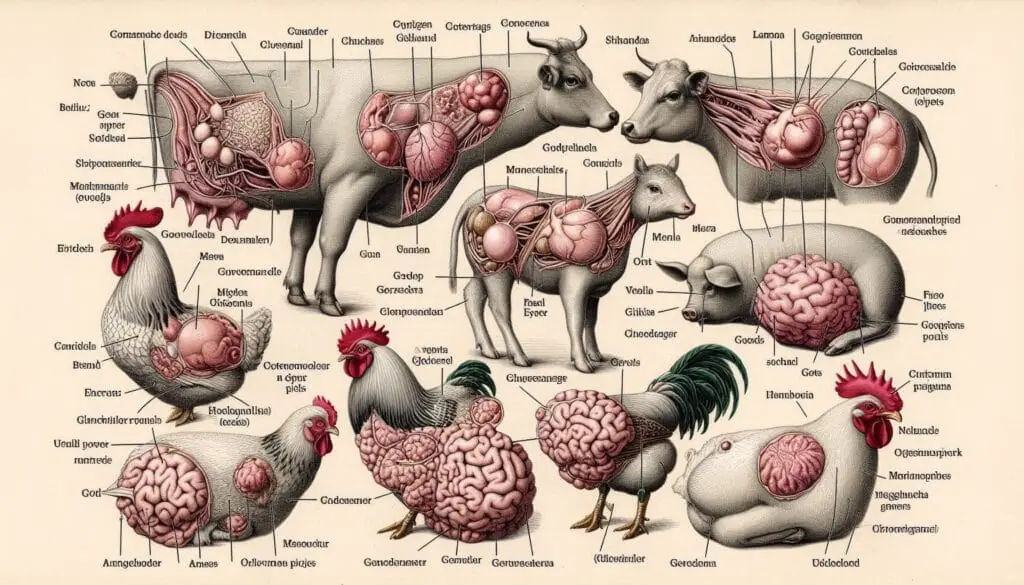Indigestion in Animals

What is Indigestion in Animals?
Indigestion, also known as dyspepsia, refers to any disturbance in the normal digestive process. This disorder can lead to discomfort and other health complications if not managed promptly. While indigestion can affect many species, it’s most commonly seen in herbivorous animals such as cows, horses, and goats, which rely on complex digestive systems to process fibrous plant materials.
For a deeper understanding of the physiological processes involved, check out this article on animal digestive systems.
Symptoms of Indigestion in Animals
Indigestion in animals may present with a variety of symptoms. Common signs to watch out for include:
Reduced Appetite
Animals suffering from indigestion may eat less or avoid food altogether. This can be due to discomfort or the inability to properly digest food.
Diminished Rumen Contractions
In ruminants, a common sign of indigestion is reduced rumen motility. The rumen is a specialized stomach chamber responsible for fermenting food. When indigestion occurs, the contractions may become irregular or weaker.
You can learn more about rumen health in this detailed guide on rumen disorders.
Abdominal Distention
Abdominal bloating is often observed in animals with indigestion. Gas can build up in the stomach, leading to visible distension. This is especially noticeable in ruminants like cows.
Changes in Fecal Output
Indigestion can cause abnormal fecal output, including diarrhea or constipation, depending on the severity of the digestive disturbance.
Lethargy and Dullness
Animals with indigestion often appear lethargic and may show less interest in their surroundings. This general malaise is due to the discomfort caused by digestive issues.
How is Indigestion Diagnosed in Animals?
Accurate diagnosis is essential to properly treat indigestion and its underlying causes. Several diagnostic tools are used to assess the severity and source of the digestive disturbance.
Clinical Examination
A thorough clinical examination by a veterinarian is the first step in diagnosing indigestion. The vet will check for signs of discomfort, abdominal bloating, and reduced rumen contractions in ruminants.
Palpation and Auscultation of the Rumen
In ruminants, the veterinarian may perform rumen palpation and auscultation. This involves feeling the abdomen and listening to rumen sounds, which help assess the digestive system’s health.
For more on rumen examination techniques, check out this resource on veterinary palpation.
Fecal Analysis
Fecal analysis can reveal any irregularities, such as the presence of undigested food particles, pathogens, or parasites that could contribute to indigestion.
Blood Tests
Blood tests are another crucial diagnostic tool. They can assess overall health, detect signs of infection, and reveal any imbalances in electrolytes that may result from digestive upset.
Imaging Techniques
Imaging techniques, including radiography and ultrasound, are used to visualize internal structures. This can help identify blockages, gas accumulation, or other issues affecting digestion.
Treatment of Indigestion in Animals
Once diagnosed, indigestion can usually be managed with a combination of dietary adjustments, medications, and supportive care. The treatment will depend on the underlying cause and severity of the condition.
Dietary Adjustments
A significant part of treatment involves changing the animal’s diet. Feeding easily digestible food, such as hay, can reduce strain on the digestive system. Avoiding sudden dietary changes is also crucial, as abrupt changes can worsen indigestion.
Rumen Stimulants and Gas Relief
In ruminants, rumen stimulants like bloat remedies or trocars may be used to relieve accumulated gas. These tools help release gas and restore normal rumen contractions.
You can learn more about bloat remedies in ruminants for better management.
Fluid Therapy
Dehydration is a common consequence of indigestion. Administering fluids through intravenous (IV) or oral therapy is important for rehydrating the animal and restoring electrolyte balance.
Pain Management
To reduce discomfort, veterinarians may prescribe analgesics. These medications help alleviate pain and improve the animal’s overall well-being.
Antibiotics for Secondary Infections
In cases where bacterial infections contribute to indigestion, antibiotics may be prescribed to treat the infection and prevent further complications.
Prevention of Indigestion in Animals
Preventing indigestion involves maintaining a healthy diet and managing the environment to reduce stress. Some key prevention tips include:
Regular Feeding Schedule
Feed animals at regular intervals to avoid overfeeding or underfeeding. Providing a balanced diet tailored to the animal’s needs helps maintain a healthy digestive system.
Manage Stress
Stress can exacerbate digestive issues in animals. Ensuring a calm, low-stress environment is essential, especially in ruminants, where stress can significantly affect rumen motility.
Proper Hydration
Ensure that animals always have access to clean, fresh water. Dehydration can lead to indigestion and other digestive problems.
Monitor Health Regularly
Routine veterinary checkups help catch digestive problems early before they become serious.
You can read more about animal stress and digestive health for further insights.
Conclusion
Indigestion in animals can be uncomfortable and potentially dangerous if left untreated. Recognizing the symptoms early and seeking veterinary care can help prevent further complications. By adjusting the diet, offering appropriate treatments, and managing stress, pet owners and farmers can maintain their animals’ digestive health.
More From Animal Diseases:
Pyridoxine deficiency in Birds





Responses